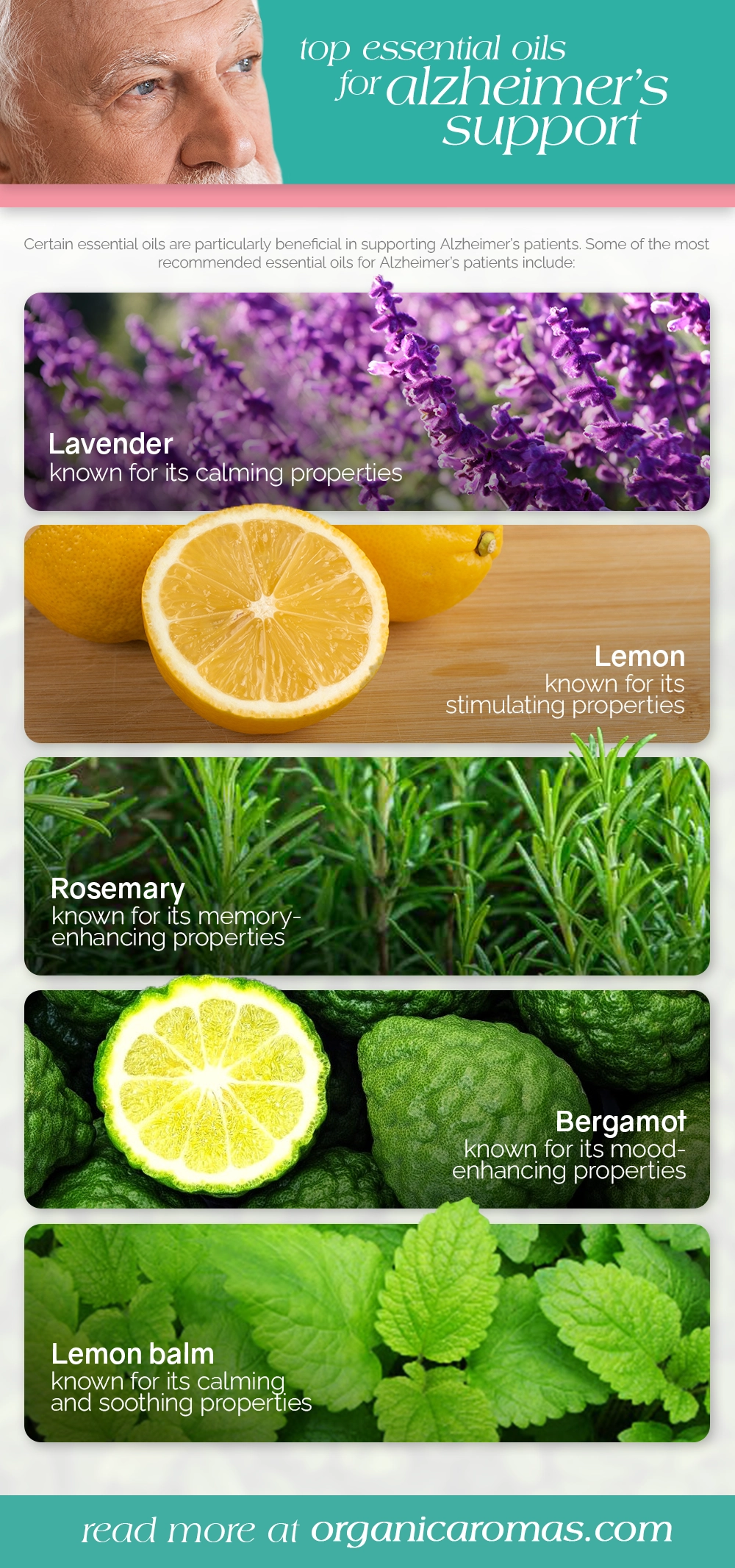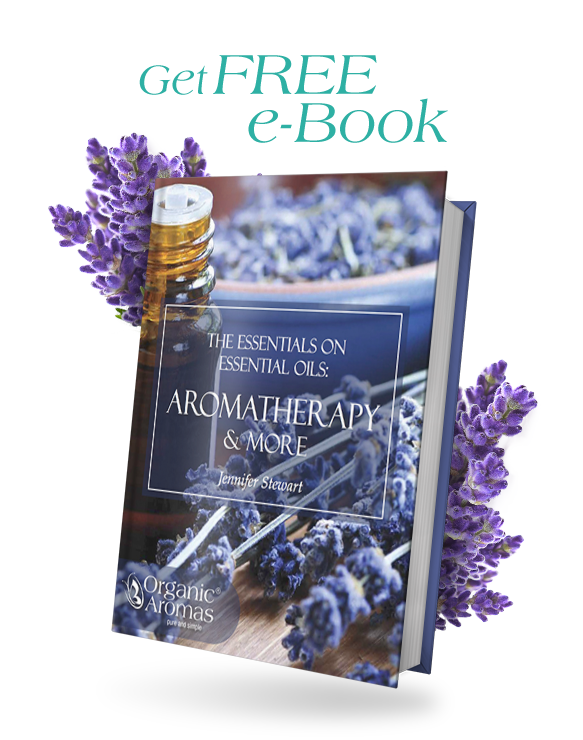Can Essential Oils Help Alzheimer’s?
Can essential oils help Alzheimer’s patients find relief and support? As the search for effective treatments continues, many are turning to alternative therapies such as aromatherapy. In this post, we’ll explore the potential benefits of using essential oils to improve cognitive function, mood, and overall quality of life for those suffering from Alzheimer’s disease.
Key Takeaways
- Research suggests that aromatherapy with essential oils may have beneficial effects on Alzheimer’s patients.
- Lavender, Lemon, Rosemary, Bergamot and Lemon Balm are the top recommended essential oils for support to provide comfort and manage symptoms.
- Working with healthcare professionals is essential for safe use of aromatherapy in managing dementia symptoms.
The Connection Between Essential Oils and Alzheimer’s Disease

Alzheimer’s patients have been found to reap cognitive, emotional, and physical benefits from the use of essential oils in aromatherapy, which enhances their quality of life and reduces symptoms. Research indicates that essential oils, such as rosemary oil, may have beneficial effects on:
- Cognitive function
- Functional performance
- Behavior
- Quality of life
- Relaxation
- Wandering
- Sleep
- Mood
In Alzheimer’s patients, clinically significant agitation is a common issue. This holds significant importance as dementia medications often exhibit limited effectiveness, especially when it comes to cognitive decline or distressed behaviors.
Aromatherapy works by activating the olfactory receptors with essential oils, thereby transmitting positive signals to the limbic system through the central nervous system. This direct effect could generate a positive emotional response, contributing to a reduction in significant clinical agitation in Alzheimer’s patients. Furthermore, some authors propose pharmacological actions of essential oils, such as the inhibition of acetylcholinesterase, which may help ease anxiety in Alzheimer’s patients.
While the use of essential oils for Alzheimer’s patients is still being explored, some studies have shown promising results in improving cognitive performance. For example, aromatherapy with rosemary oil has been found to potentially improve cognitive performance in Alzheimer’s patients, although more research is needed to confirm these findings.
The Science Behind Aromatherapy
Aromatherapy has been practiced for centuries, with the potential to enhance various aspects of well-being in Alzheimer’s patients. Some benefits of aromatherapy include:
- Enhancing cognitive performance
- Improving functional performance
- Influencing behavior
- Enhancing quality of life
- Promoting relaxation
- Reducing wandering
- Improving sleep
- Enhancing mood
Essential oils, derived from various plants, can activate olfactory receptors, which transmit signals through the central nervous system to the limbic system, an area of the brain associated with emotions and memories. This can result in a positive emotional response, which can help reduce agitation and other behavioral symptoms in Alzheimer’s patients.
Beyond their impact on the olfactory system, essential oils could potentially exhibit pharmacological actions that assist in managing Alzheimer’s symptoms. For example, some authors have proposed that essential oils may inhibit acetylcholinesterase, an enzyme that breaks down the neurotransmitter acetylcholine, which is involved in memory and learning. By inhibiting this enzyme, essential oils may help ease anxiety and other symptoms in Alzheimer’s patients.
Benefits for Alzheimer’s Patients
Research has indicated that aromatherapy, using uplifting oils like bergamot, may be beneficial for reducing anxiety, agitation, and other behavioral symptoms in Alzheimer’s patients, as well as potentially improving cognitive function and memory. Aromatherapy has been shown to be effective in reducing anxiety, agitation, and other behavioral symptoms among Alzheimer’s patients, even those with severe dementia.
For instance, lemon balm oil has demonstrated potential as a safe and efficacious treatment for individuals with Alzheimer’s. Research suggests that lemon balm oil could potentially alleviate stress and anxiety and improve agitation. In a study conducted by Burns 2011, using lemon balm essential oil as a massage oil on agitation in Alzheimer’s patients, it was suggested that treatment should be administered for a period of four weeks to potentially improve cognitive performance.
In the Ballard 2002 study, the aromatherapy group displayed a significantly reduced amount of time socially withdrawn and a significantly increased amount of time engaged in constructive activities when compared to the control group. The Oliveira 2015 systematic review suggests that aromatherapy may be effective in reducing agitation among individuals with dementia. These findings highlight the potential benefits of aromatherapy for Alzheimer’s patients in improving cognitive function, memory, and overall quality of life.
Top Essential Oils for Alzheimer’s Support
Certain essential oils are particularly beneficial in supporting Alzheimer’s patients. Some of the most recommended essential oils for Alzheimer’s patients include:
- Lavender: known for its calming properties
- Lemon: known for its stimulating properties
- Rosemary: known for its memory-enhancing properties
- Bergamot: known for its mood-enhancing properties
- Lemon balm: known for its calming and soothing properties
These essential oils can help provide comfort and support for Alzheimer’s patients.

Each essential oil possesses unique properties that can assist in managing particular Alzheimer’s symptoms, like lavender for inducing relaxation and rosemary for stimulating cognitive functions. By selecting the right essential oils, caregivers and healthcare professionals can develop a personalized aromatherapy plan that caters to the patient’s individual needs and preferences.
Properties and Uses

Distinct properties within each essential oil can assist in managing specific Alzheimer’s symptoms. For example, lavender is known for its calming and soothing properties, which make it beneficial for Alzheimer’s patients. It has been observed to reduce agitation, aggression, and frequency of agitation in elderly patients with dementia. Moreover, lavender oil has a balancing and antidepressant effect on emotions, making it helpful for insomnia and promoting relaxation.
Bergamot oil, often referred to as “Nature’s Prozac,” is a popular choice for alleviating anxiety, stress, and depression due to its uplifting yet calming properties. Vetiver oil has been found to possess anti-inflammatory properties that can help reduce stiffness and pain, improve blood flow, and promote relaxation. Additionally, it is known for its ability to improve brain function and mental alertness.
Peppermint oil has been found to stimulate the appetite and support memory in Alzheimer’s patients, as well as helping to reduce anxiety and relieve headaches. Ylang-ylang oil can be beneficial for individuals with Alzheimer’s disease, as it has properties that can reduce anxiety, anger, and depression, lower blood pressure, and induce sleep. Moreover, ylang-ylang oil is known to improve the quality of sleep.
Comprehending the unique properties of individual essential oils enables caregivers and healthcare professionals to choose the most suitable oils for addressing the unique needs and preferences of Alzheimer’s patients.
Precautions and Safety Tips
Although essential oils can provide a multitude of benefits for Alzheimer’s patients, consulting with a healthcare professional before integrating them into a treatment plan is crucial. Ingesting essential oils is not recommended for Alzheimer’s patients, as it can lead to potential side effects and complications.
Awareness of potential risks and side effects is vital when using essential oils. These may include irritation and burning when applied topically, asthma attacks in individuals with asthma, and the potential for rash and other adverse reactions when used improperly. To minimize these risks, it is essential to dilute essential oils with a carrier oil before applying them topically and to use them with caution.
By consulting with healthcare professionals and following safety guidelines, caregivers and patients can ensure a safe and effective treatment using essential oils for Alzheimer’s.
Methods of Application for Alzheimer’s Patients

Various methods can be utilized to employ essential oils for providing therapeutic benefits to Alzheimer’s patients. Diffusers, vaporizers, and massages are among the most common methods of application. Each method has its advantages and can help deliver the beneficial properties of essential oils to Alzheimer’s patients.
The choice of application method hinges on the individual needs and preferences of the patient, and the specific essential oils in use. For example, diffusers and vaporizers can provide a continuous release of essential oils into the air, creating a calming atmosphere and promoting relaxation. Massages, on the other hand, can help stimulate the production of endorphins, reducing stress and agitation, improving mood, reducing pain, and improving sleep quality and the immune system.
Choosing the Right Diffuser
When selecting a diffuser for Alzheimer’s patients, it is important to consider factors such as ease of use, cleaning, and the patient’s specific needs and preferences. There are various types of diffusers available, including:
- Ultrasonic/humidifying
- Heat
- Evaporative
- Nebulizing Diffuser
- Natural wood
Each type of diffuser has its own advantages and disadvantages, so it is essential to select the one that best suits the patient’s needs.
Nebulizing diffusers, for example, use a small air pump to generate a vacuum that draws essential oil up through a tube and atomizes it into a fine mist. Due to the lack of heat or moisture, nebulizing diffusers provide a pure release of essential oils, making them beneficial for Alzheimer’s patients. Mayo Clinic therapists suggest using two drops of essential oil on a cotton ball for inhalation as another method of application.
Creating a Calming Environment
Using essential oils to create a soothing atmosphere for Alzheimer’s patients can help reduce agitation and promote relaxation. Creating a calming environment can involve blending various essential oils, such as:
- Bergamot
- Lemon
- Rosemary
- Lavender
- Lemongrass
- Lemon-scented tea tree
- Lemon balm
These oils can have a calming effect while also helping to uplift mood and boost memory.
In addition to selecting the right essential oils, it is essential to consider the frequency and duration of aromatherapy sessions to create a calming environment for Alzheimer’s patients. Studies have indicated frequencies ranging from twice a week to four times a day, with each session typically lasting for approximately 20 minutes. It is advisable to consult with a healthcare professional or aromatherapist to determine the most suitable frequency and duration for individual patients.
Creating a calming environment with essential oils can:
- Help Alzheimer’s patients feel more at ease
- Improve their overall quality of life
- Address symptoms such as agitation, anxiety, and depression
- Contribute to a more positive and nurturing atmosphere for both the patient and their caregivers.

Join Now and Get a Coupon for 10% Off!
Research and Studies on Aromatherapy for Alzheimer’s
Although some studies have yielded promising results in using aromatherapy for Alzheimer’s patients, further research is necessary to validate its efficacy and safety. The quality of evidence for aromatherapy for Alzheimer’s patients ranges from very low to moderate, as evidenced by small sample sizes and inconsistency in results.
Larger, well-designed studies are needed to provide conclusive evidence on the benefits and potential risks of aromatherapy for Alzheimer’s patients. Improved study design and reporting, as well as consistent outcome measurement in upcoming studies, are necessary for drawing reliable conclusions.
Promising Results
Some studies have shown improvements in cognitive function, memory, and behavior in Alzheimer’s patients using aromatherapy. For instance, essential oils such as lavender, bergamot, and lemon balm have been found to reduce aggression, agitation, and other psychotic symptoms in patients with dementia.
Other research has indicated that the following essential oils may be beneficial in improving cognitive function and memory:
- Lavender essential oil: enhances word recall and working memory
- Rosemary essential oil: improves learning and memory
- Orange essential oil: induces neurite outgrowth
While these studies show promising results, further investigation is needed to determine the overall success rates of aromatherapy for Alzheimer’s patients and to better understand the potential benefits and risks of using essential oils for Alzheimer’s treatment.
Areas for Further Research
For a better understanding of aromatherapy’s effects on Alzheimer’s patients, there’s a need for further research, inclusive of larger and well-structured studies. Areas for further research include:
- Identifying the specific risks associated with aromatherapy for Alzheimer’s patients
- Studying the yet-to-be-explored benefits of aromatherapy for Alzheimer’s patients
- Examining the mechanisms of action of essential oils in the brain and their potential to reverse cognitive and memory impairments associated with Alzheimer’s disease.
Researching the effects of aromatherapy on Alzheimer’s patients presents certain challenges, such as:
- Limited clinical research
- Lack of evidence
- Limited studies available
- Difficulty in conducting controlled studies
- Limited funding and resources
Despite these challenges, continued exploration of aromatherapy’s potential benefits for Alzheimer’s patients is essential to provide alternative treatment options and improve the quality of life for those affected by this devastating disease.
In the meantime, personal accounts from caregivers and patients highlight the positive impact of aromatherapy on the lives of those affected by Alzheimer’s disease. These stories serve as a reminder of the potential benefits of aromatherapy in improving symptoms and quality of life for Alzheimer’s patients, and they emphasize the importance of continued research in this area.
Personal Stories and Testimonials

Positive effects of aromatherapy on individuals suffering from Alzheimer’s disease have been reported by caregivers and patients. These personal accounts showcase the potential of essential oils to improve cognitive function, mood, and overall quality of life for Alzheimer’s patients.
As research continues to explore the potential benefits of aromatherapy for Alzheimer’s patients, these personal stories and testimonials serve as a reminder of the power of alternative therapies in improving the lives of those affected by this challenging disease. By sharing their experiences, caregivers and patients can inspire others to explore the potential benefits of aromatherapy for Alzheimer’s patients, offering hope and support to those in need.
Professional Recommendations and Guidelines
The integration of aromatherapy into Alzheimer’s care greatly depends on the role of healthcare professionals. They can:
- Provide guidance on the appropriate use of essential oils
- Administer aromatherapy treatments
- Inform patients and caregivers about its advantages and potential risks
National and international guidelines, such as the National Institute for Health and Care Excellence (NICE) guidelines, recommend the use of non-pharmacological strategies, including dementia aromatherapy, for managing dementia-related symptoms.
By working with healthcare professionals, caregivers and patients can develop a personalized aromatherapy plan that considers the specific needs and preferences of Alzheimer’s patients. This collaborative approach ensures the safe and effective use of essential oils for Alzheimer’s treatment, providing an additional layer of support for those affected by the disease.
Integrating Aromatherapy into Alzheimer’s Care
The successful integration of aromatherapy into Alzheimer’s care relies on healthcare professionals, including nurses, physical therapists, and pharmacists. They can administer topical or inhaled aromatherapy treatments to patients with Alzheimer’s disease, ensuring that the treatment is tailored to the individual’s specific needs and preferences.
Suggested methods for incorporating aromatherapy into Alzheimer’s care encompass the use of essential oils like lavender, rosemary, and geranium to enhance mood, relieve stress, and ease muscle aches in individuals with Alzheimer’s. Aromatherapy can also be used in combination with other treatments for Alzheimer’s, such as psychological interventions, to provide a comprehensive approach to managing symptoms like agitation and anxiety.
To effectively integrate aromatherapy into Alzheimer’s care, caregivers and healthcare professionals should collaborate to develop a personalized aromatherapy plan that addresses the specific needs and preferences of the patient. This may include:
- Selecting the most appropriate essential oils
- Determining the optimal frequency and duration of aromatherapy sessions
- Ensuring that the treatment is administered safely and effectively

Sign Up to Get Your FREE
e-Book Here…
Working with Healthcare Professionals
The safe and effective use of essential oils for Alzheimer’s patients is greatly attributed to the pivotal role of healthcare professionals. By consulting with healthcare professionals and following safety guidelines, caregivers and patients can minimize the potential risks and side effects associated with aromatherapy.
Healthcare providers who administer or supervise aromatherapy for Alzheimer’s patients should possess training and qualifications in dementia care. This includes:
- Familiarity with dementia management
- An understanding of the various stages of dementia
- An awareness of the particular needs and challenges of Alzheimer’s patients
Memory care certification and recognized dementia care training programs are beneficial for healthcare providers in terms of developing their skills in this area.
By working closely with healthcare professionals, caregivers and patients can ensure that aromatherapy is integrated into Alzheimer’s care in a safe and effective manner. This collaborative approach can help maximize the potential benefits of aromatherapy while minimizing the potential risks and side effects.
Summary
Aromatherapy offers a promising alternative therapy for Alzheimer’s patients, with the potential to improve cognitive function, mood, and overall quality of life. While more research is needed to fully understand its effectiveness and safety, personal stories and testimonials highlight the positive impact of aromatherapy on the lives of those affected by Alzheimer’s disease. By working with healthcare professionals and incorporating essential oils into Alzheimer’s care, caregivers and patients can explore the potential benefits of this complementary therapy and provide an additional layer of support for those affected by this challenging disease.
Frequently Asked Questions
What are 3 things to never do with your loved one with dementia?
Never tell your loved one with dementia that they’re wrong, don’t argue, don’t ask if they remember something, don’t remind them of a loved one’s death or bring up topics that may upset them.
What is the best source for help if someone has Alzheimer’s disease?
For help and support with Alzheimer’s disease, call the Alzheimer’s Association helpline at 1 800 272 3900 or the Alzheimer’s Foundation of America at 1-866-232-8484, or contact other community resources such as faith-based organizations, your local Area Agency on Aging, and the Alzheimer’s Association. You can also find information and resources through the National Institute on Aging (NIA) Alzheimers.gov and Alzheimer’s Disease Education and Referral (ADEAR) Center.
What can help someone with Alzheimer’s?
Having a sense of structure and familiarity, engaging in social activities, providing emotional support, and planning enjoyable daily activities can help someone with Alzheimer’s. Educating oneself on the disease can also be beneficial for caregivers.
What is the best essential oil for memory loss?
Lavender, bergamot, and lemon essential oils have been shown to be effective in calming memory care patients and helping them with cognitive performance. Therefore, these are the best essential oils for memory loss.
What are the potential benefits of aromatherapy for Alzheimer’s patients?
Aromatherapy has potential to reduce anxiety, agitation, and other behavioral symptoms in Alzheimer’s patients, as well as potentially improve cognitive function, mood, and memory. These benefits could lead to an improved quality of life overall.


Great information here! I use Lavender a lot, glad to see it is on this list.
This is great information and I learned a lot! It’s great to know with Alzheimer’s running in the family!
I always thought Rosemary was the oil for memory. I was delighted to read that bergamont and peppermint are also good for the memory. I don’t have alzheimer’s, but I worry about of getting it one day, so I would use this blend in a diffuse often just to keep my memory sharp. Thanks!
This is good to know, I hope it can improve the lives of those with this disease.
Alzheimer is a huge problem now-a-days. It is great to hear that EO’s can help out with that. Will have to try peppermint at work for concentration!
I hope I never have to worry about this, but I fear I will, my mom is getting older and her mother had Alz.
A very good article with excellent information.
They say that scents can also help to bring back memories of times in the past when someone smelt them. Much like music can.
Great article, I love my essential oils and have found they help in so many ways
I never considered previously that essential oils could help improve alzeimer symptoms. Good information ?
I think disease should be treated with traditional and alternative medicine.